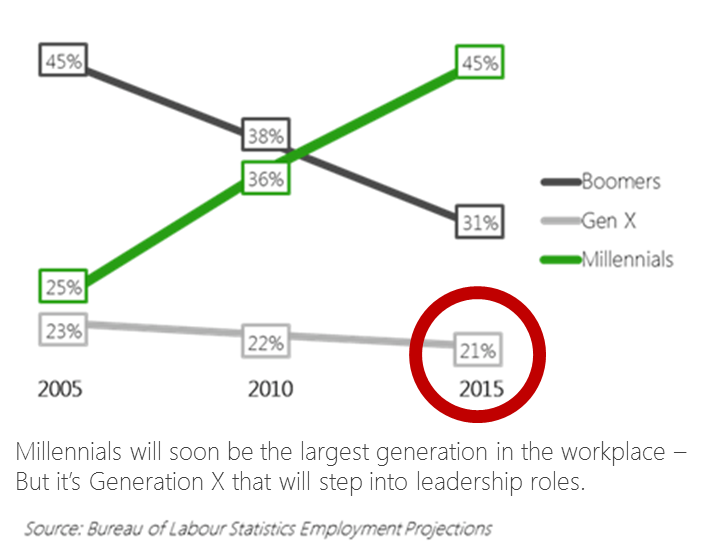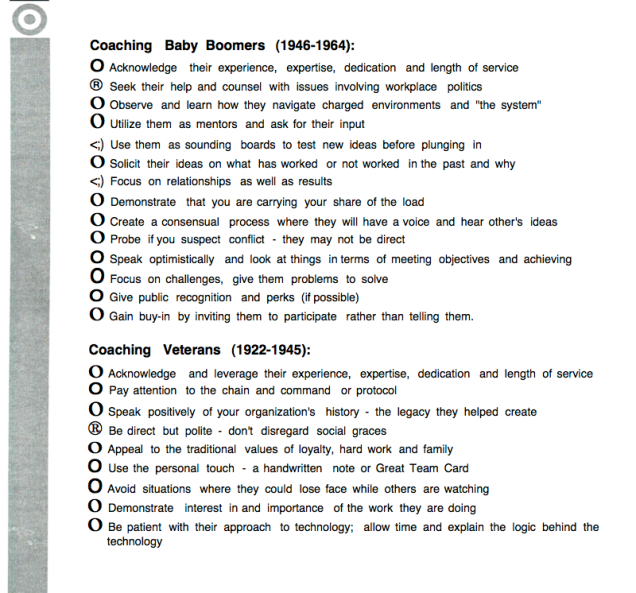Training Why the Millennial Generation’s Needs Differ
Post on: 16 Март, 2015 No Comment

In earlier generations of workers, an unspoken, sink-or-swim approach to on-the-job training was often good enough to bring new employees up to speed. Yet that approach might be less effective with those from the Millennial or Generation Y demographic, a group raised with different expectations and work styles.
Millennials, possibly more than any other generation, require clear direction, guidance and goals from their managers. This is because many Millennials have grown up in schools that use rubrics to evaluate the quality of an assignment. According to the National Education Association (NEA) web site, rubrics are “scoring tools that divide an assignment into its component parts and objectives, and provide a description of what constitutes acceptable and unacceptable levels of performance for each part.” In many cases rubrics are provided to students at the time an assignment is given so they know exactly what to do to achieve a certain grade.
Most Millennials are used to well-defined assignments, clear benchmarks and continual feedback and discussion. As such, it is the process they assume will be in place in the business world. The lack of success many companies have experienced in working with Millennials is the result of a collision between this generation’s worldview and how most companies function.
A New Approach
To leverage the talents of this highly educated and goal-oriented generation, companies need a new approach. Rather than assuming that new workers will absorb an organization’s culture without explicit discussion and while proceeding just as their elders have done, enlightened companies are re-designing supervisor and leadership training to accommodate the more interactive and collaborative work styles of Millennials.
Managers need to understand that the young members of their workforce will place more immediate demands on them than managers likely placed on their mentors. This means that managers must be prepared to spend as much time describing the task an employee is expected to complete as they spend explaining proper business behavior, such as cell phone and Internet use at work.
The new training paradigm must connect the dots for Millennials, who thrive on certainty and clarity. For many, ambiguity is not part of their immediate skill set, in part because this generation grew up playing video games with static rules.
According to consumer research psychologist Kit Yarrow, a professor of psychology and marketing at Golden Gate University in San Francisco and author of Gen Buy: How Tweens, Teens and Twenty-Somethings Are Revolutionizing Retail (Jossey-Bass, 2009), context is everything when it comes to working with Millennials: “Value shifts become less threatening when the context within which they’re created is clearly identified. Context builds understanding, which shifts judgment to empathy,” she said. “In the workplace, empathy is the difference between a tolerated or manipulated workforce and an inspired one. It’s easier to train, coach, adapt or compromise when behaviors feel less personal and consequently less threatening.”
Collaboration is an innate skill among Millennials, so using this strength will enhance their commitment as well as increase productivity.
Importance of Being Millennial-Friendly
It is critical that managers engage young workers in their comfort zone to avoid high turnover and the indifference such workers can experience when a workplace is not Millennial-friendly. Unlike other groups of workers, research has found that members of this demographic group have little loyalty and harbor deep skepticism about the business world—that is, until they come to appreciate and trust their supervisors.
“My research suggests that Millennials remain very cynical about the corporations in which they work,” said Daniel W. Rasmus, author of Listening to the Future: Why It’s Everybody’s Business (Wiley, 2008) and an expert on Millennials in the workplace. “They have heard about outsourcing, downsizing and layoffs for years. According to the data I’ve seen, Millennials were laid off in greater numbers than older workers during the recession, which reinforced their lack of trust or any motivation to create a lasting relationship with any firm,” he added.
“If organizations want to regain the trust of this generation, they need to go to extraordinary measures. Organizations must be willing to make the necessary investments—such as mentoring, training and investing in company social networks—that will help prove they are worthy places for young people to place their loyalty.”

Rasmus said it is critical to pre-empt any unhealthy disagreements among workers of different ages: “We can either stand by and watch age warfare as the Millennials and Boomers battle it out for dominance in the workplace, or we can negotiate a mutually beneficial common ground that will engage employees and help organizations innovate,” he said. “Ultimately, this is a business continuity issue and thus a strategic issue for most businesses. Organizations don’t have a real choice in confronting it. If they ignore the issue, it will be a strategic misstep. If they embrace it, organizations may well find it a competitive advantage, especially if they do it sooner than later.”
Manager training programs that anticipate Millennials’ inherently different workplace expectations are likely to build productive teams and create new leaders. New times require new tactics. Companies that rethink their approach to training younger workers are likely to gain a significant advantage. For those that don’t, the opposite might be true.
Diane Spiegel is CEO of The End Result , a corporate training and development firm, and creator of the Sage Leadership Tools , communication resources that help managers work more effectively with Millennials.
Interested in this topic?
Learn more at these SHRM 62nd Annual Conference & Exposition sessions, to be held in late June 2010 in San Diego:
- 21 st Century Leadership for a 21 st Century Workforce
- Dude, What’s My Job? Managing Millennials in Today’s Workforce
- Managing, Motivating and Leading a Multigenerational Workforce
- Future Workforce: Millennials in a Global Context
Learn more about this event














